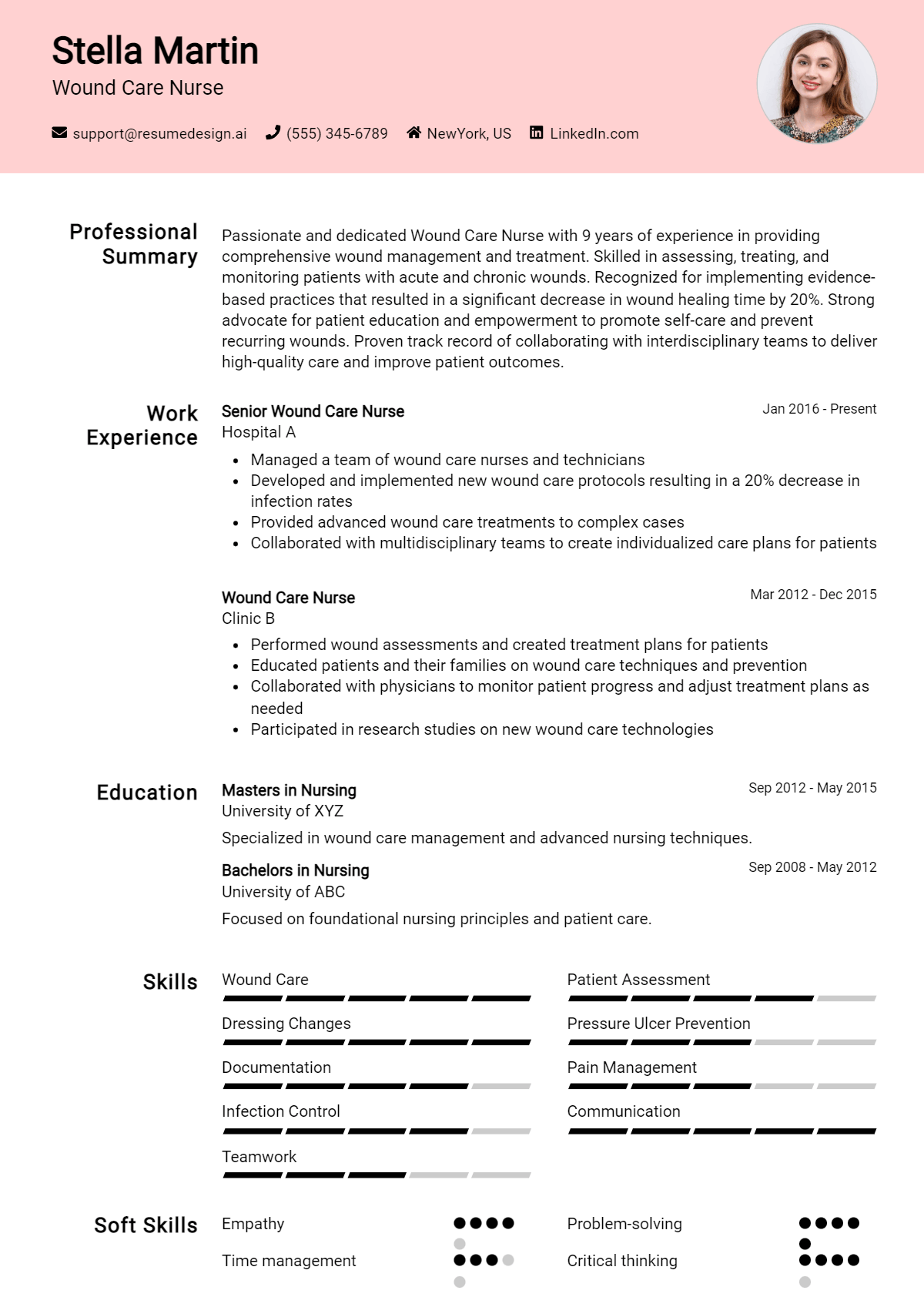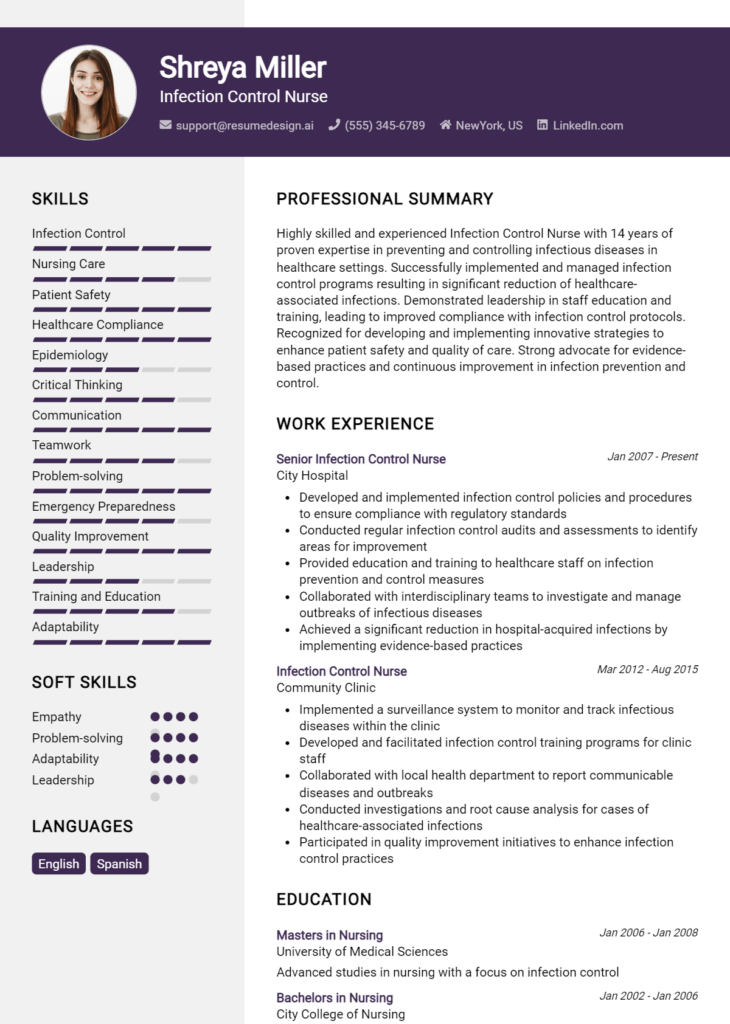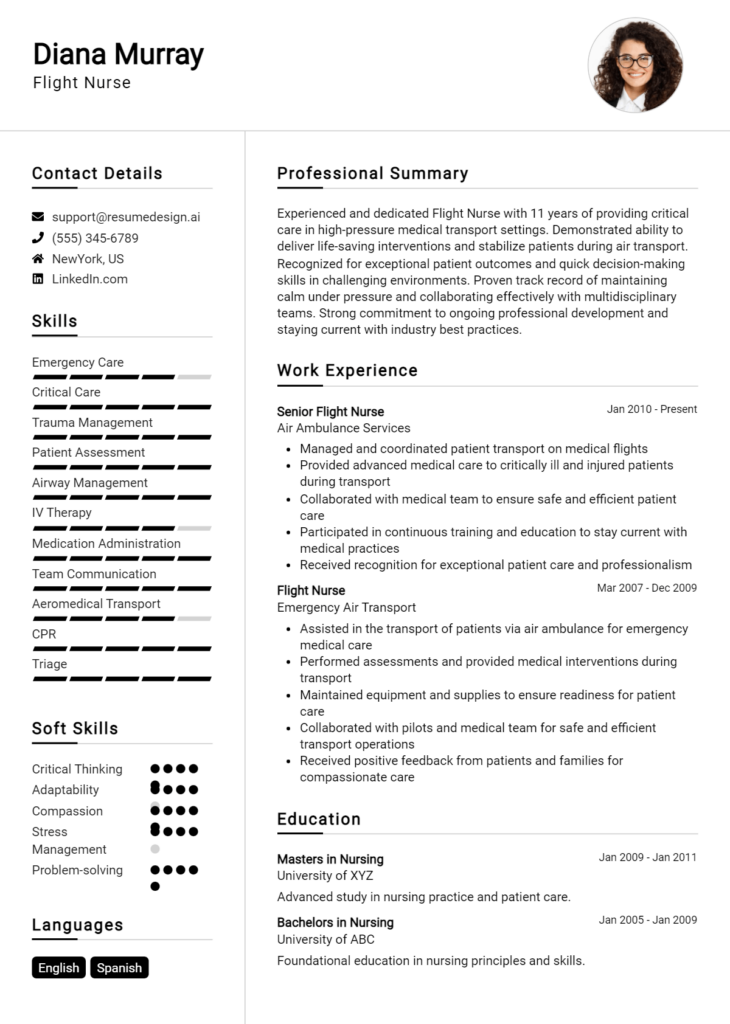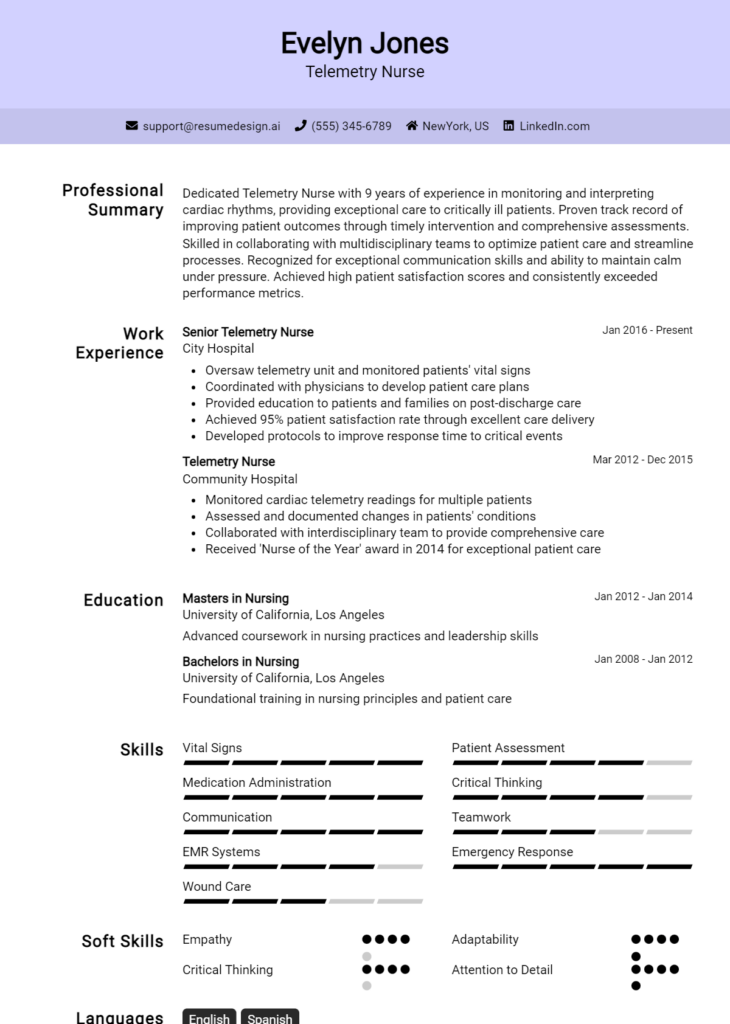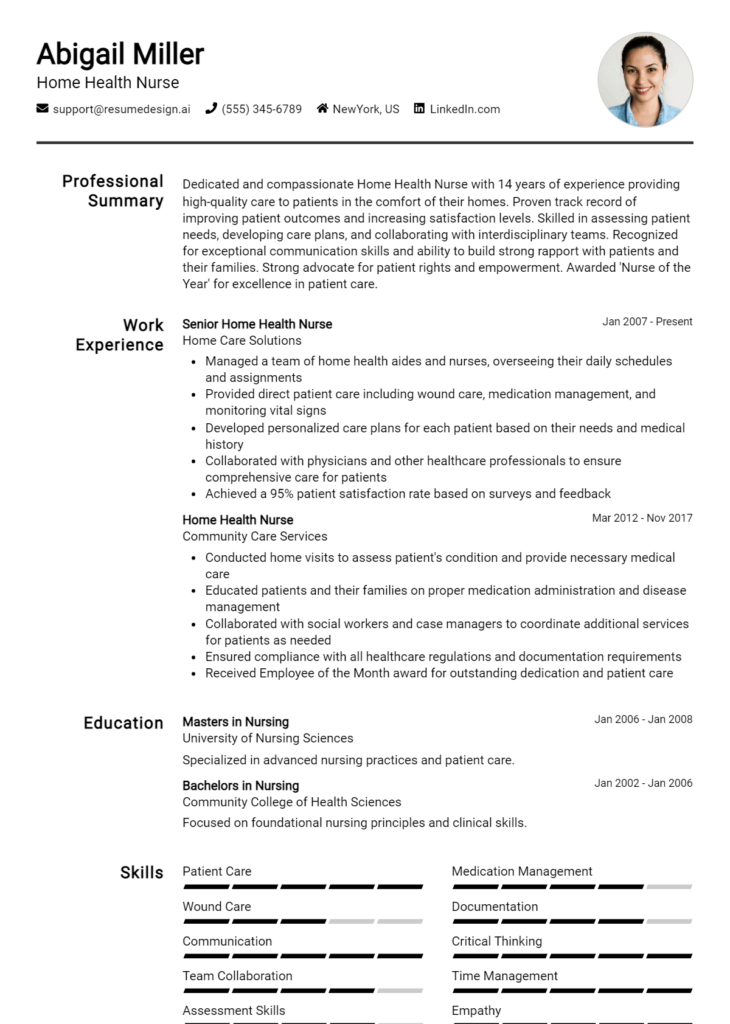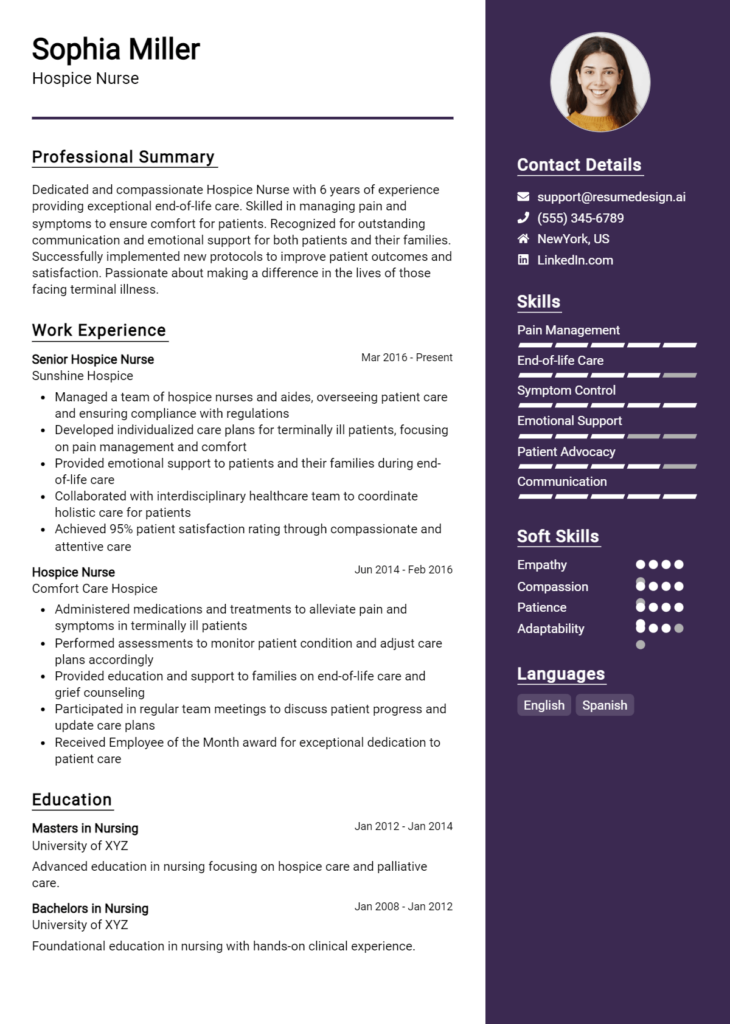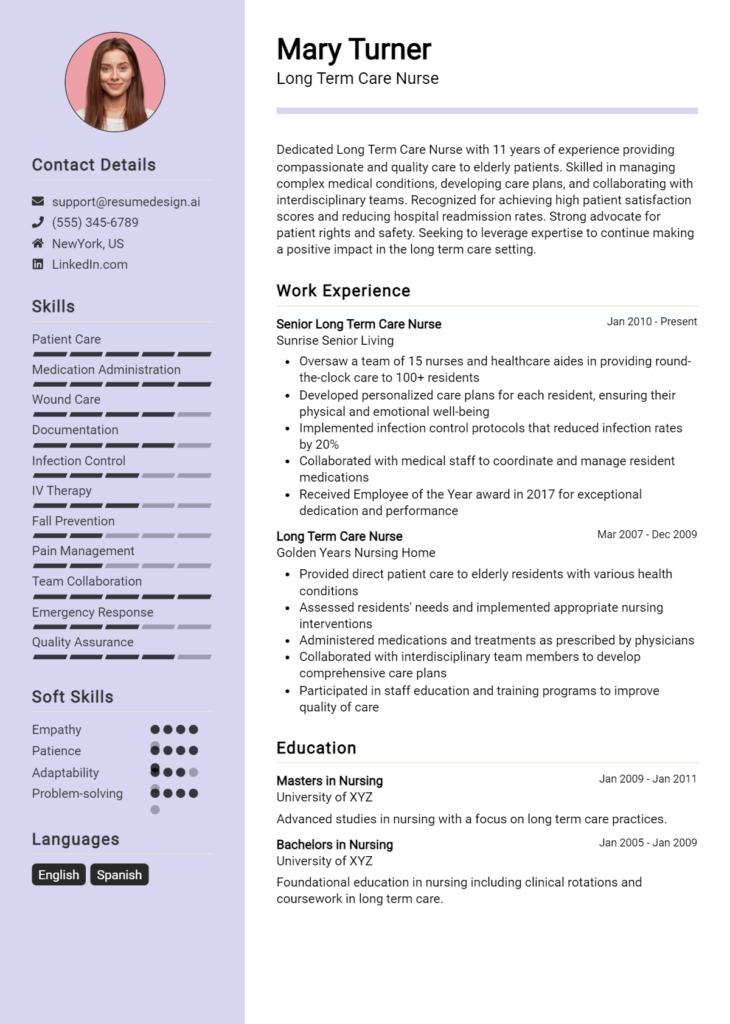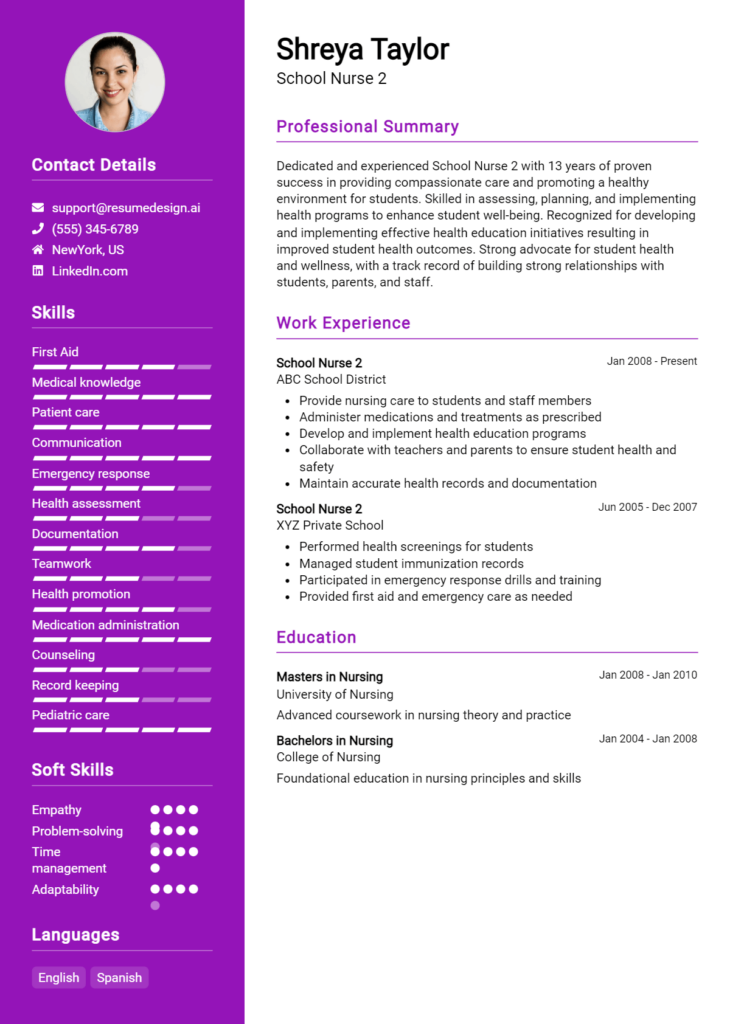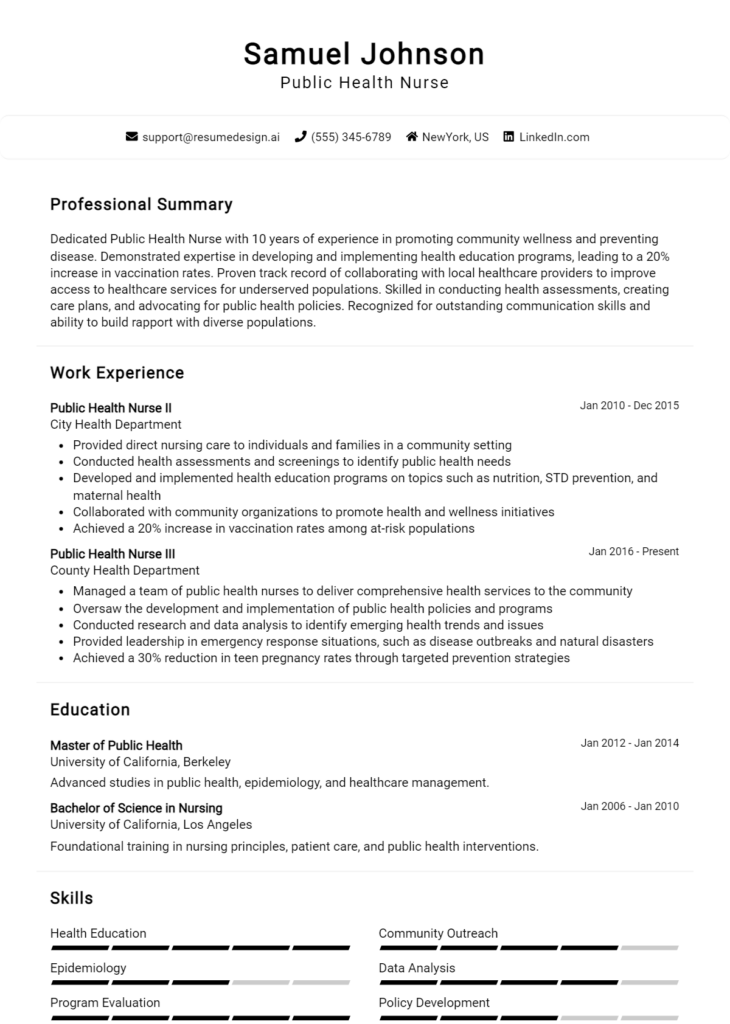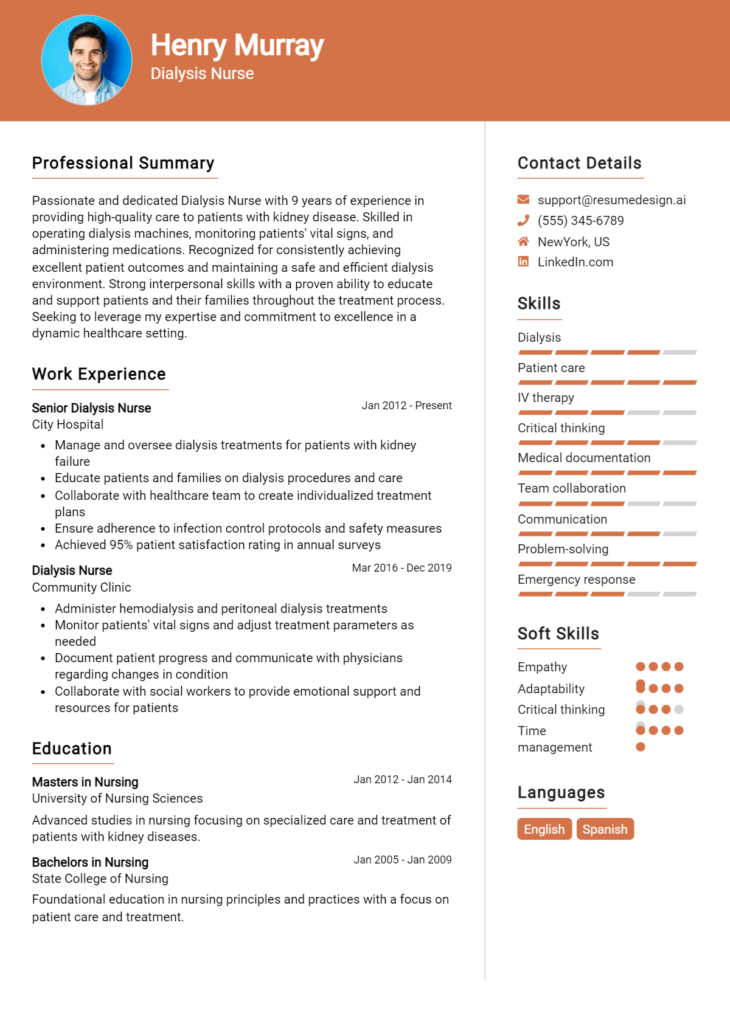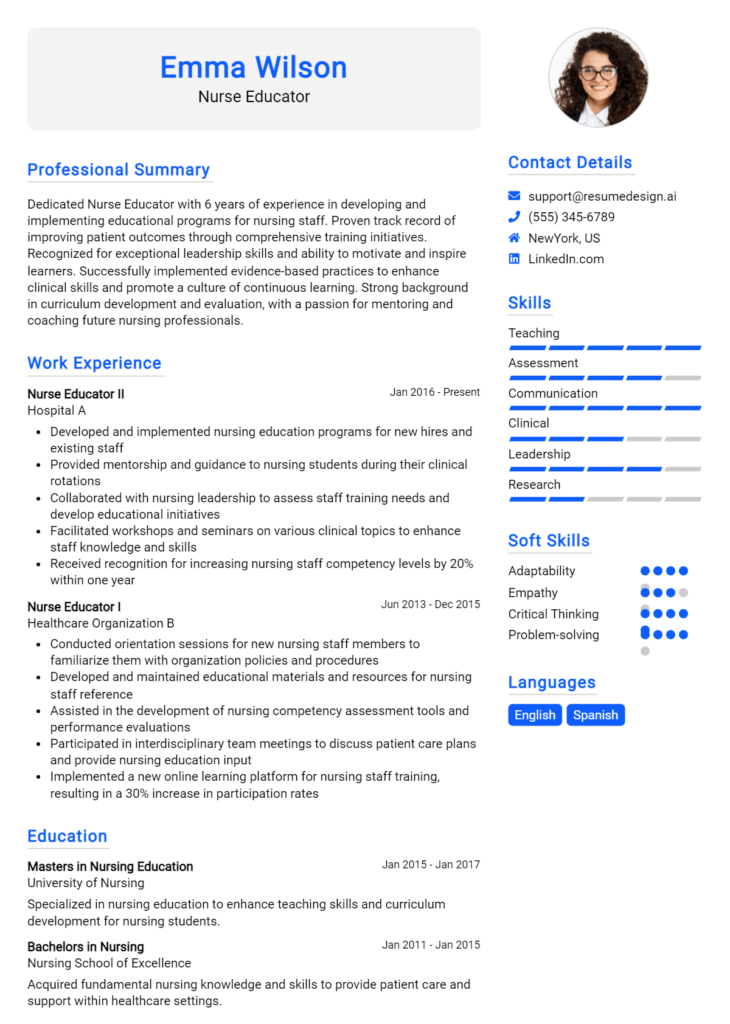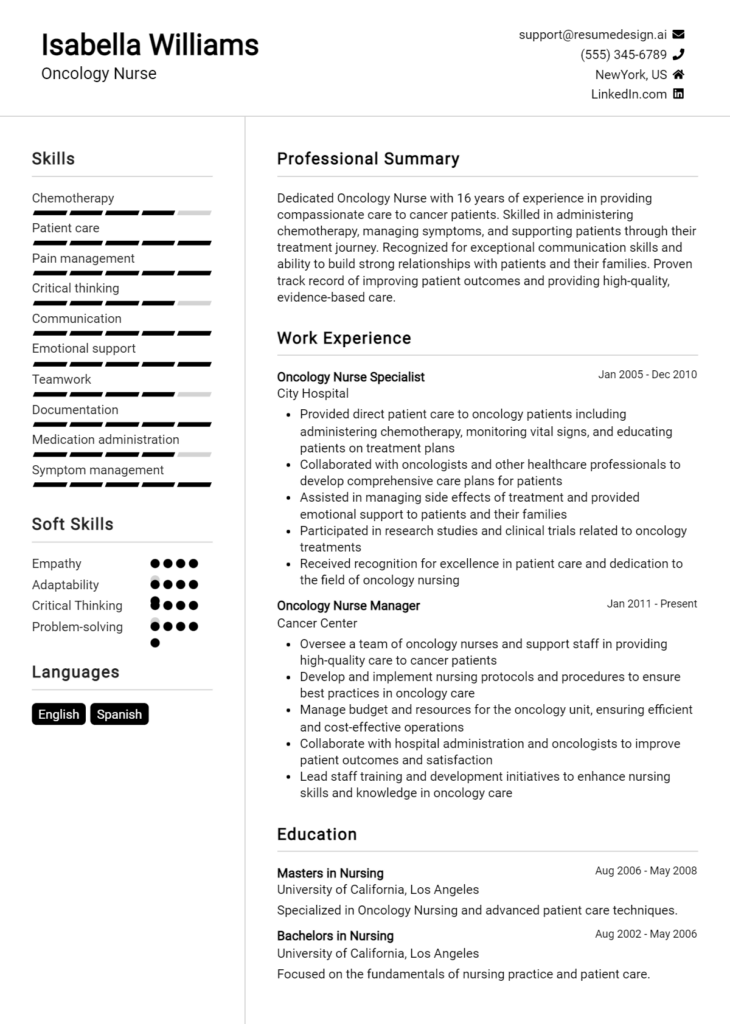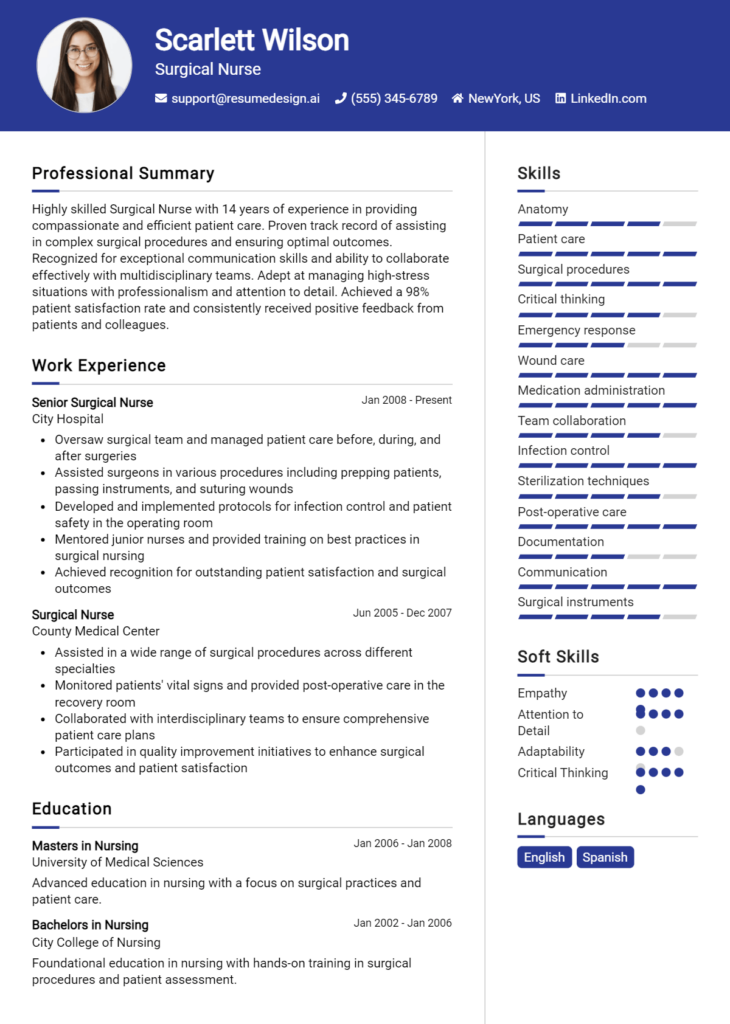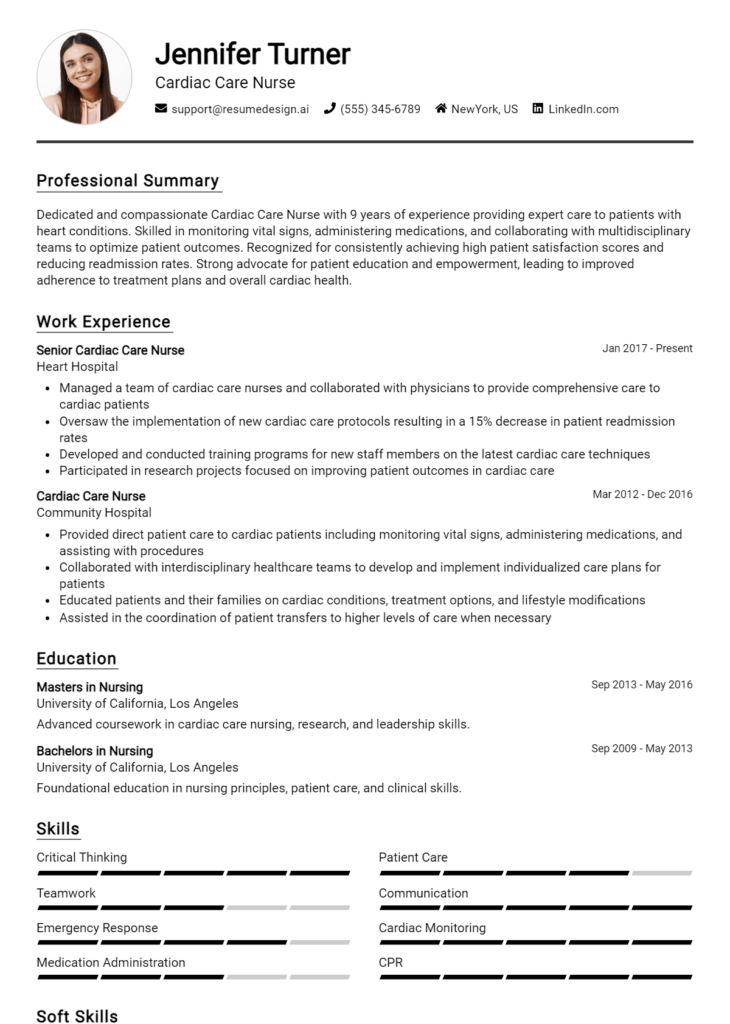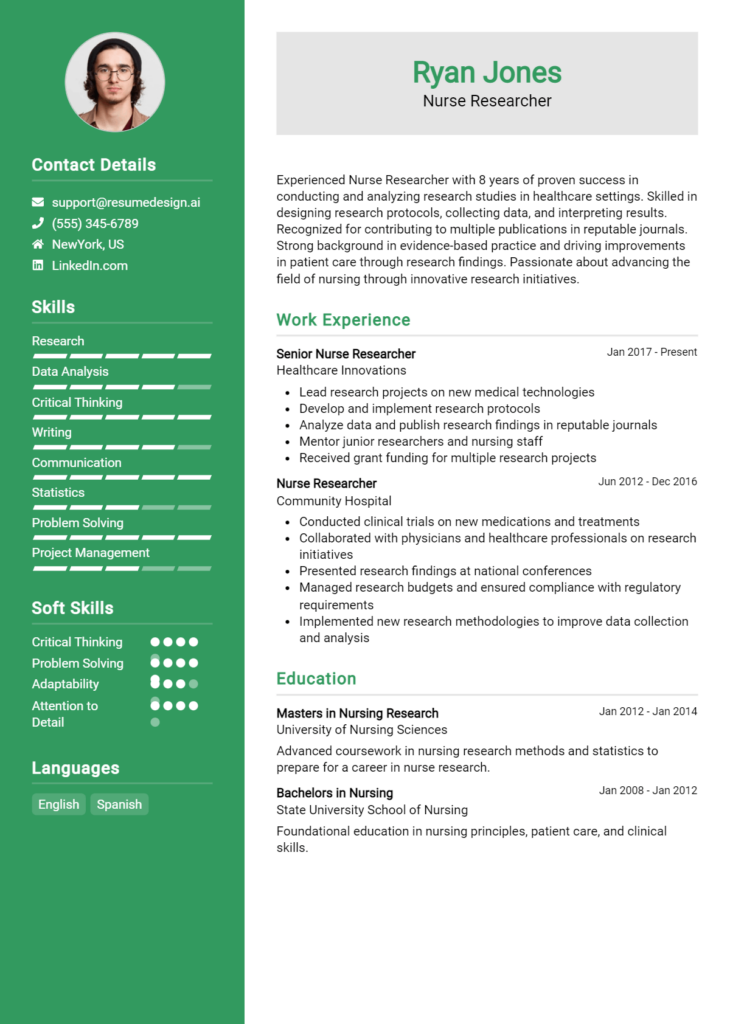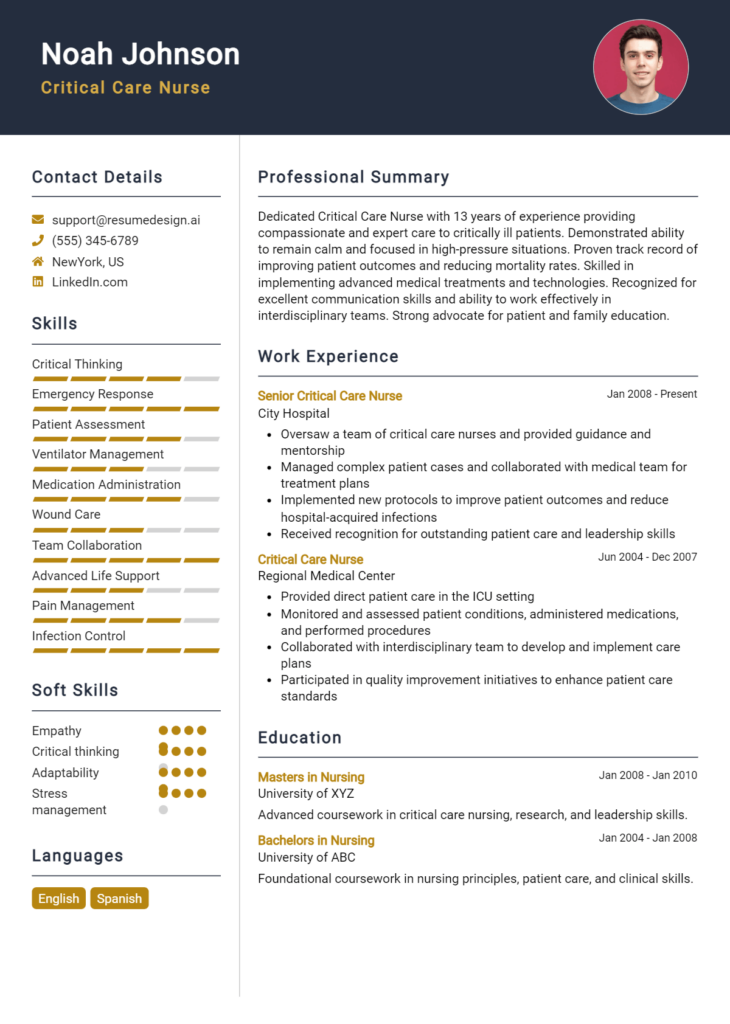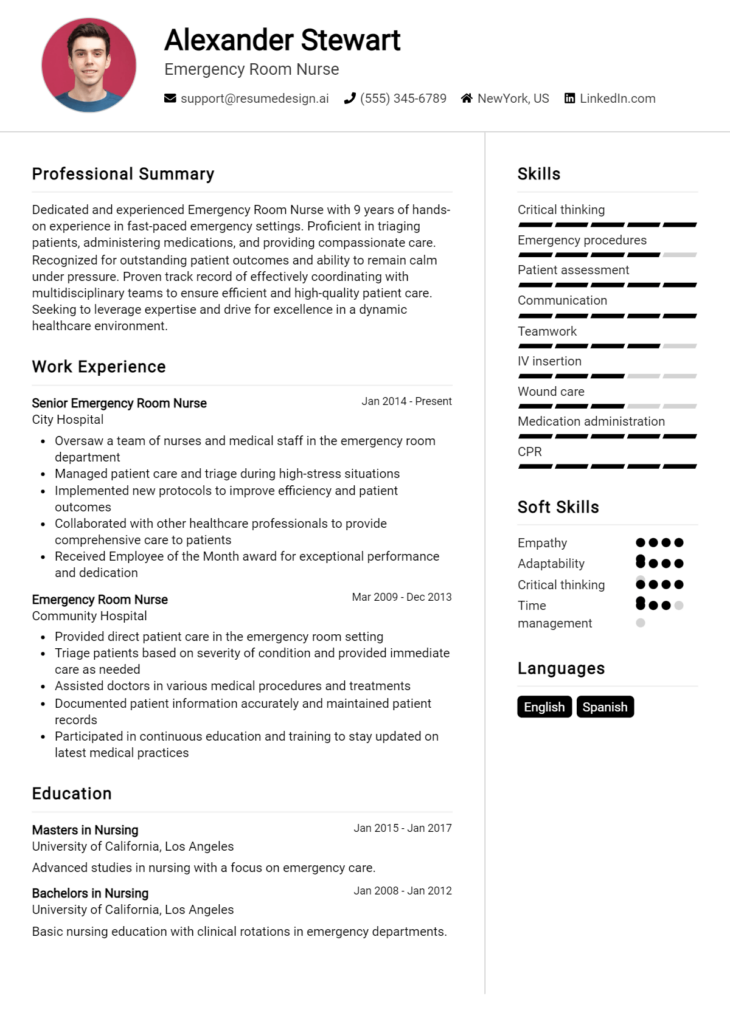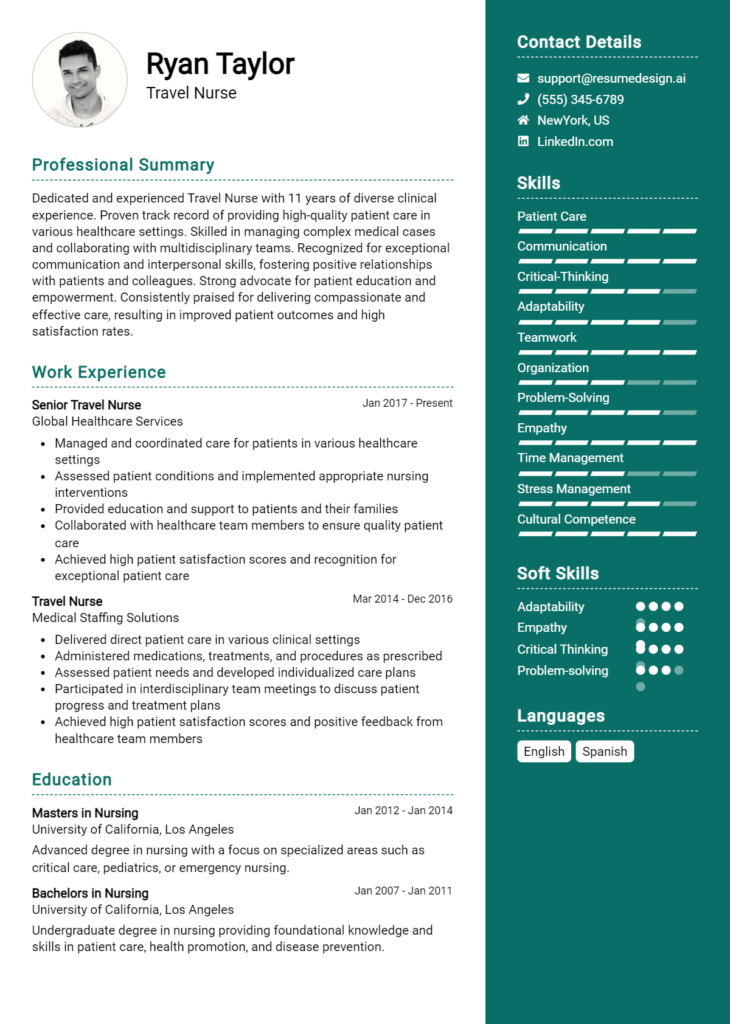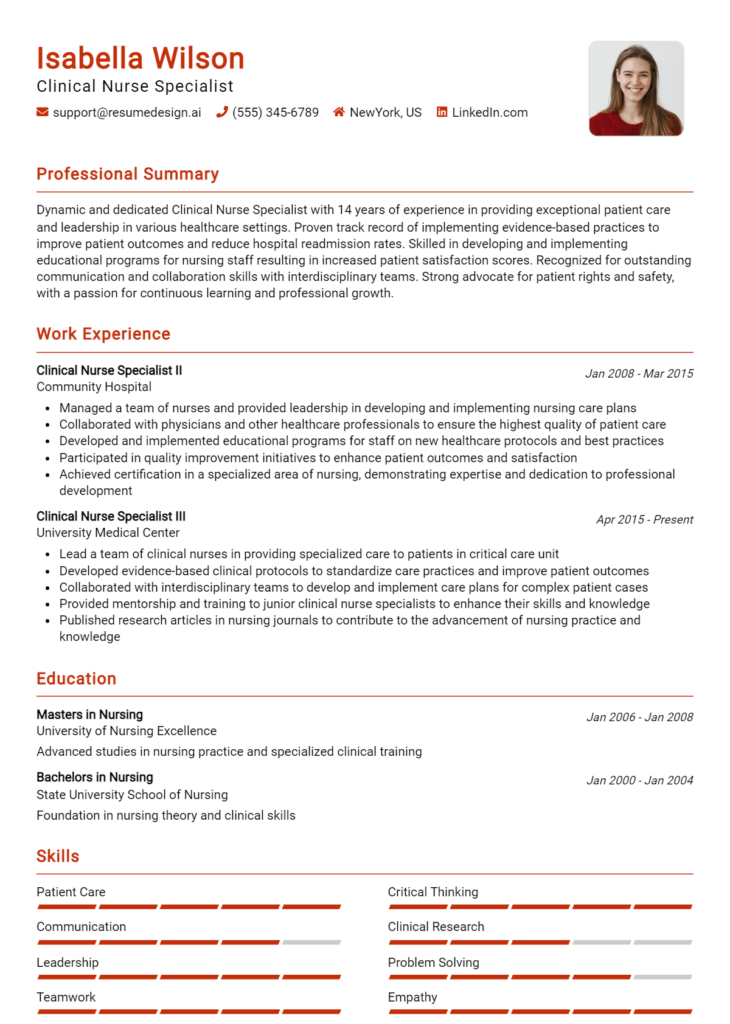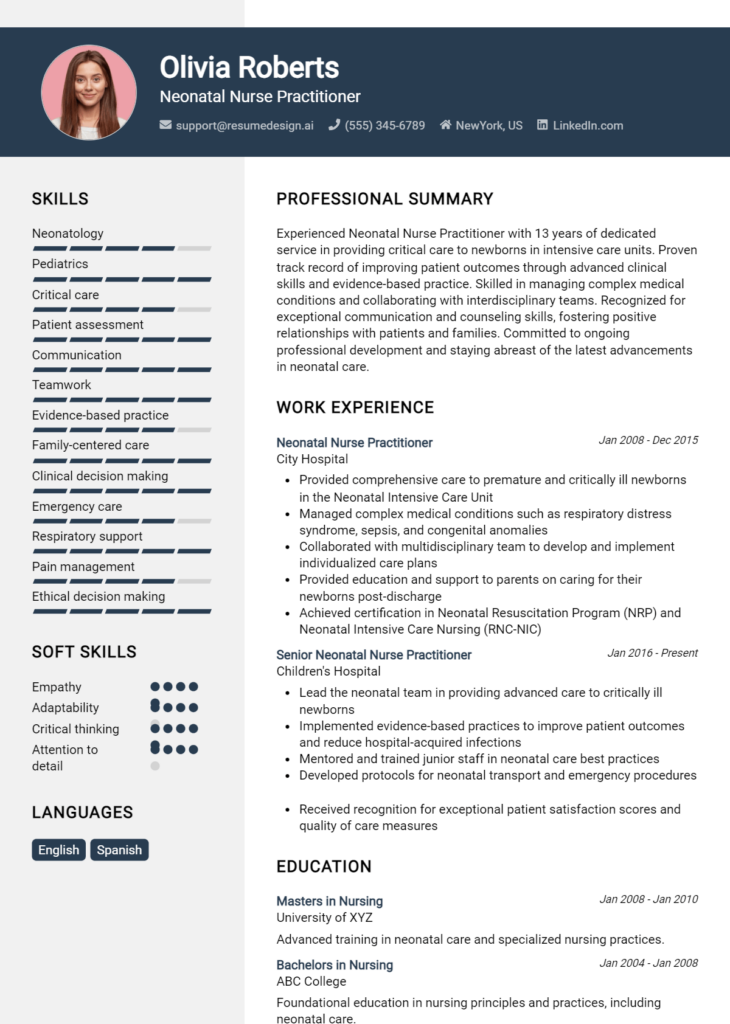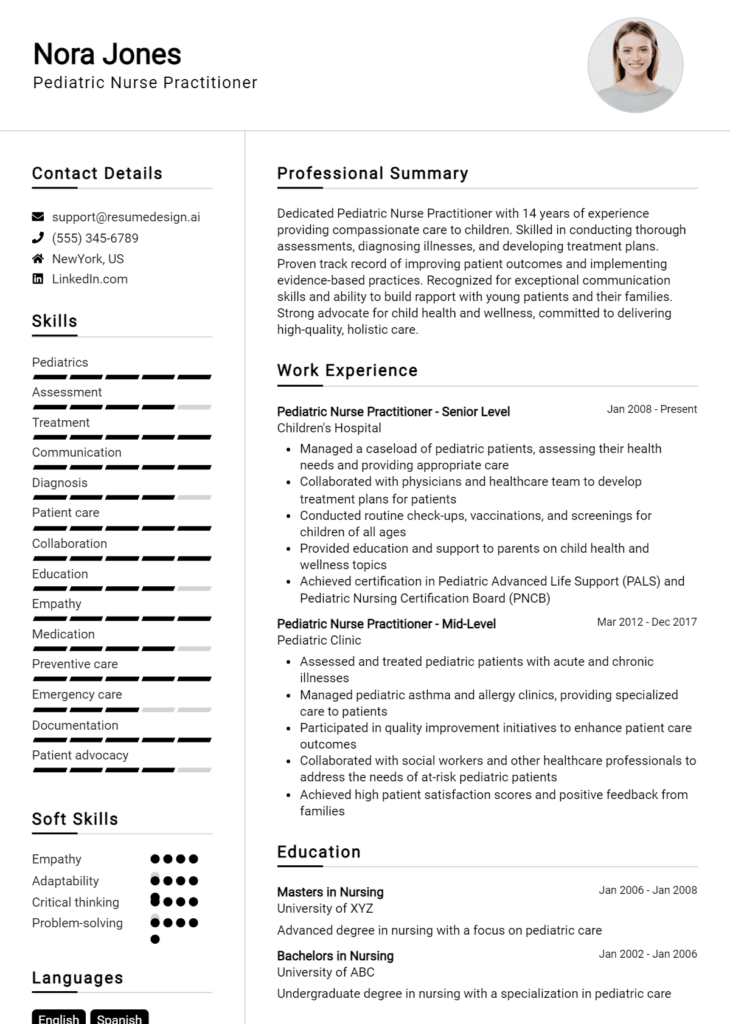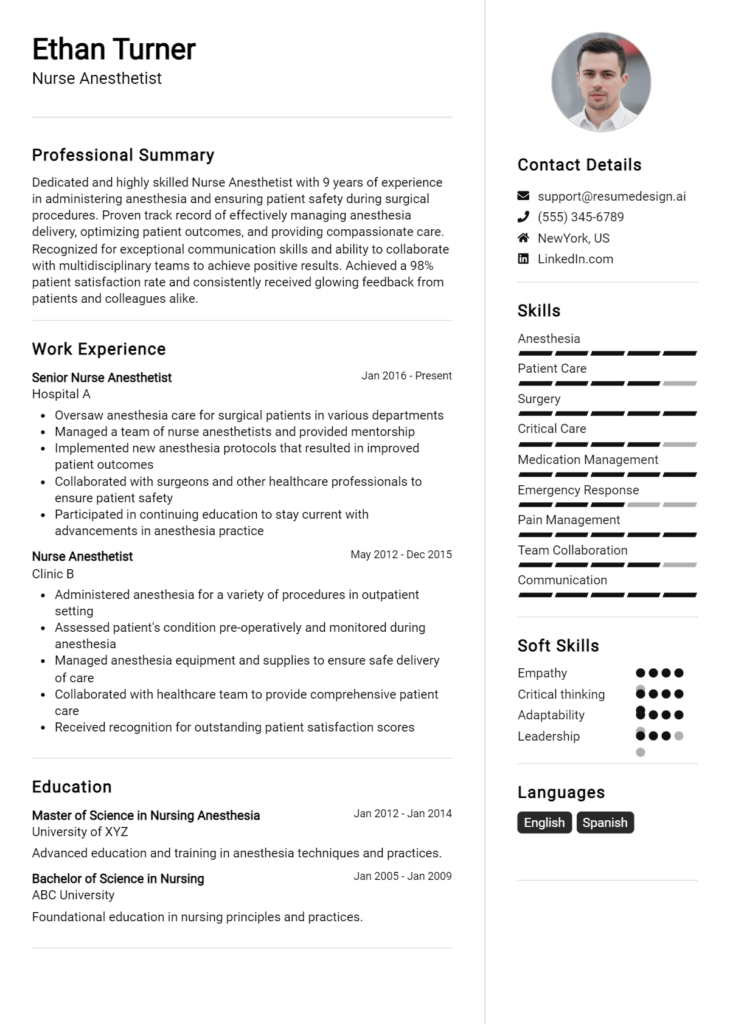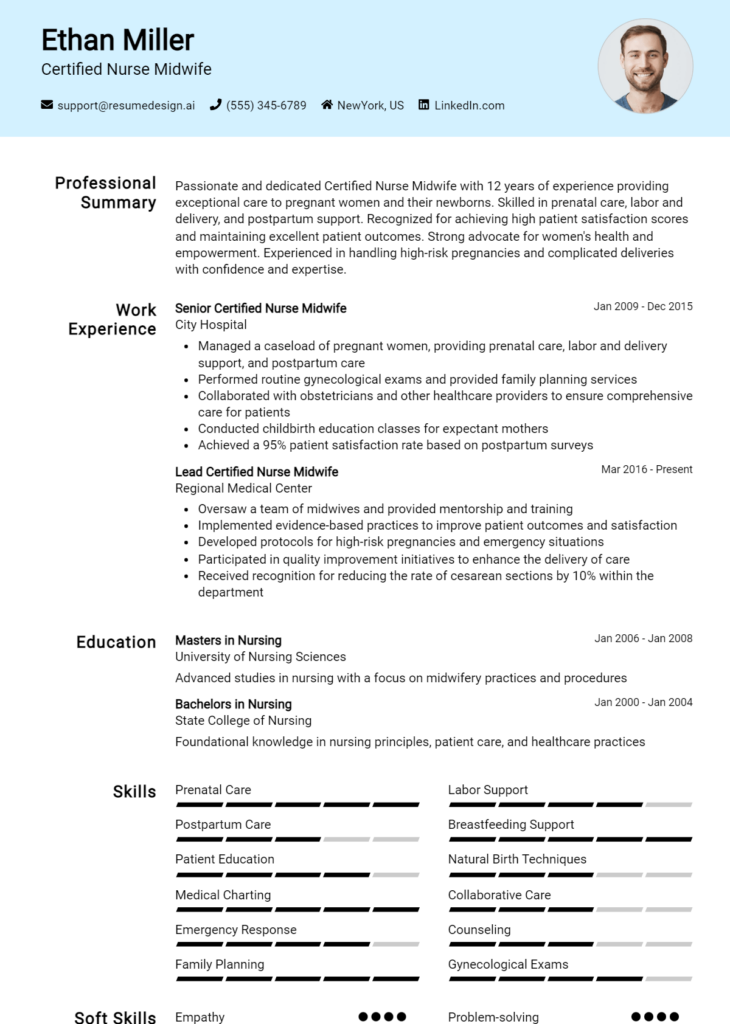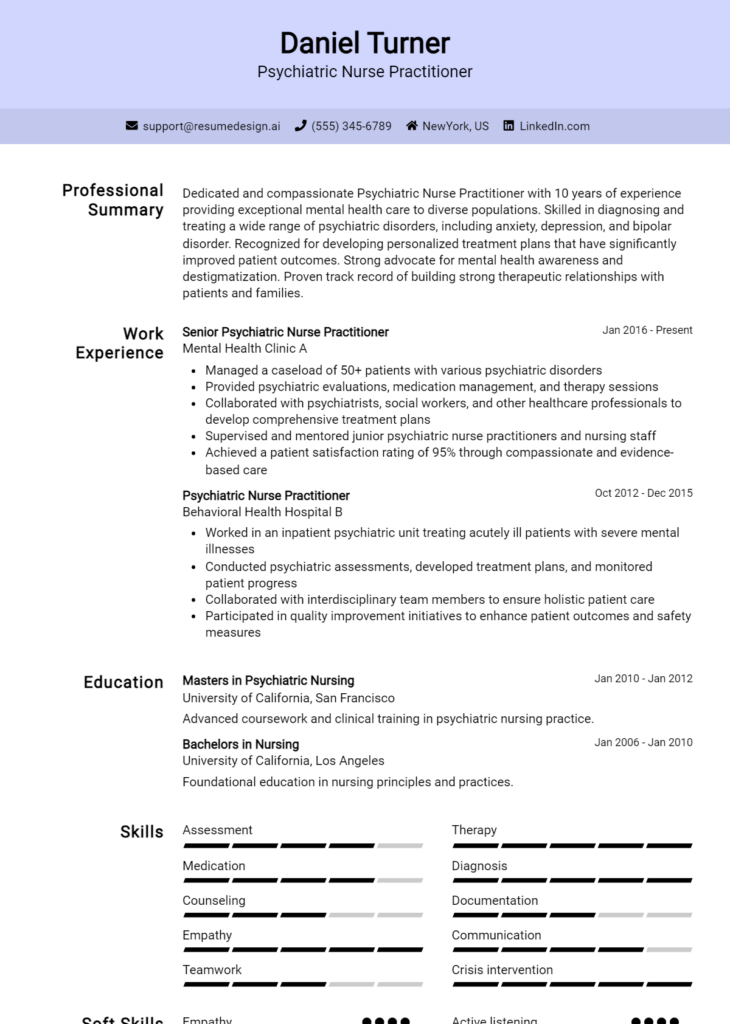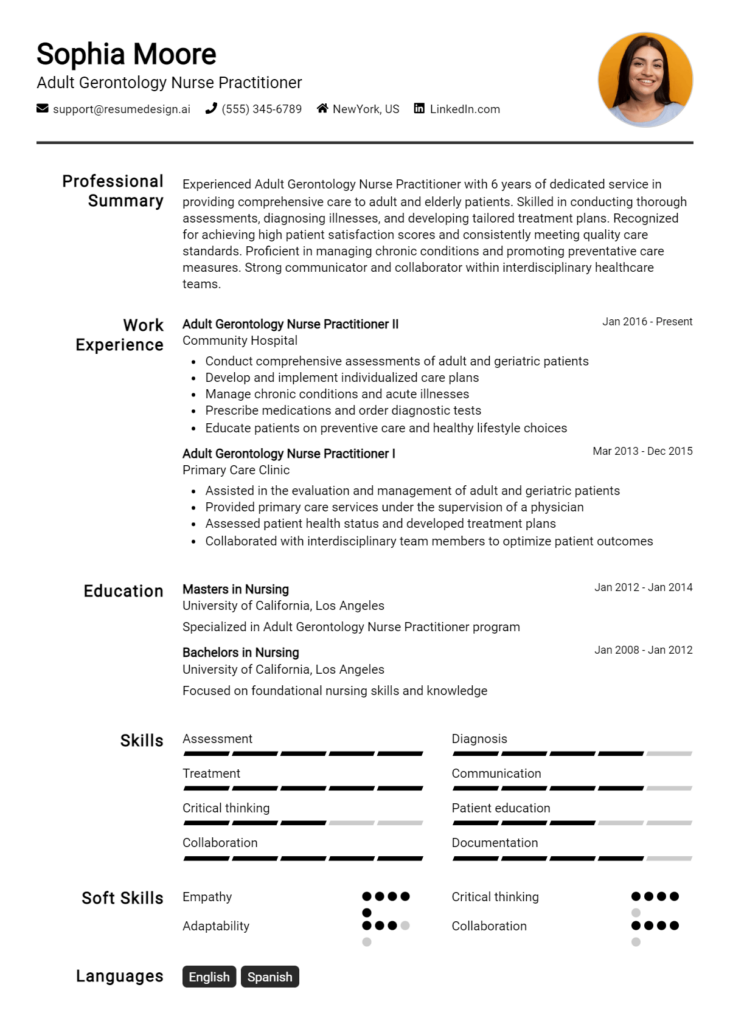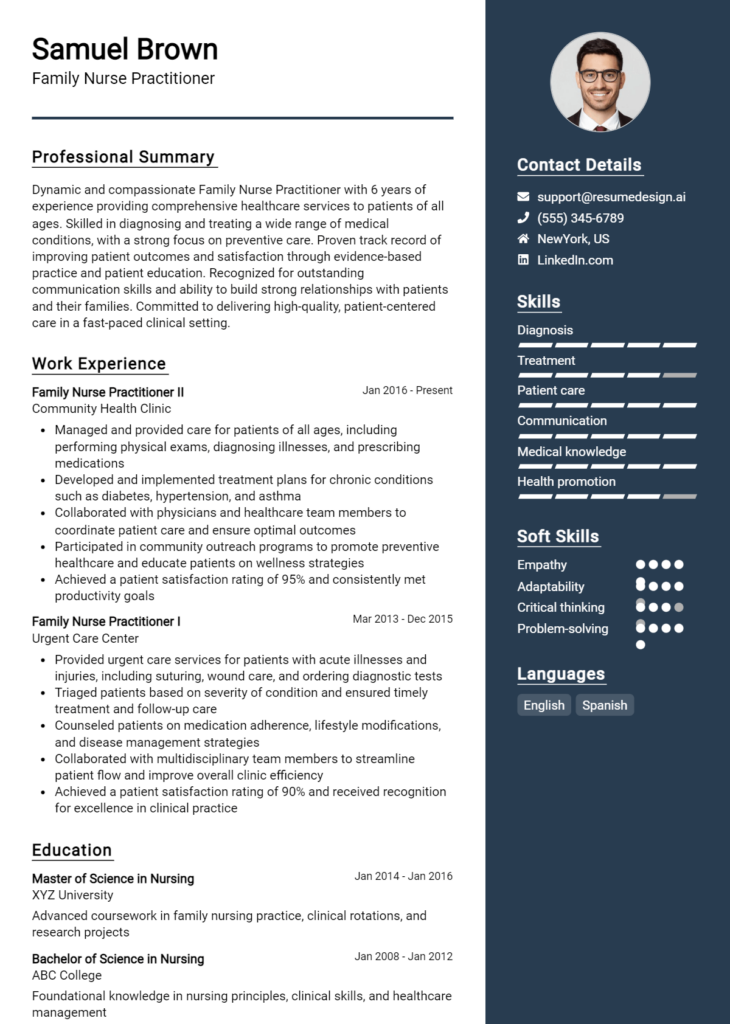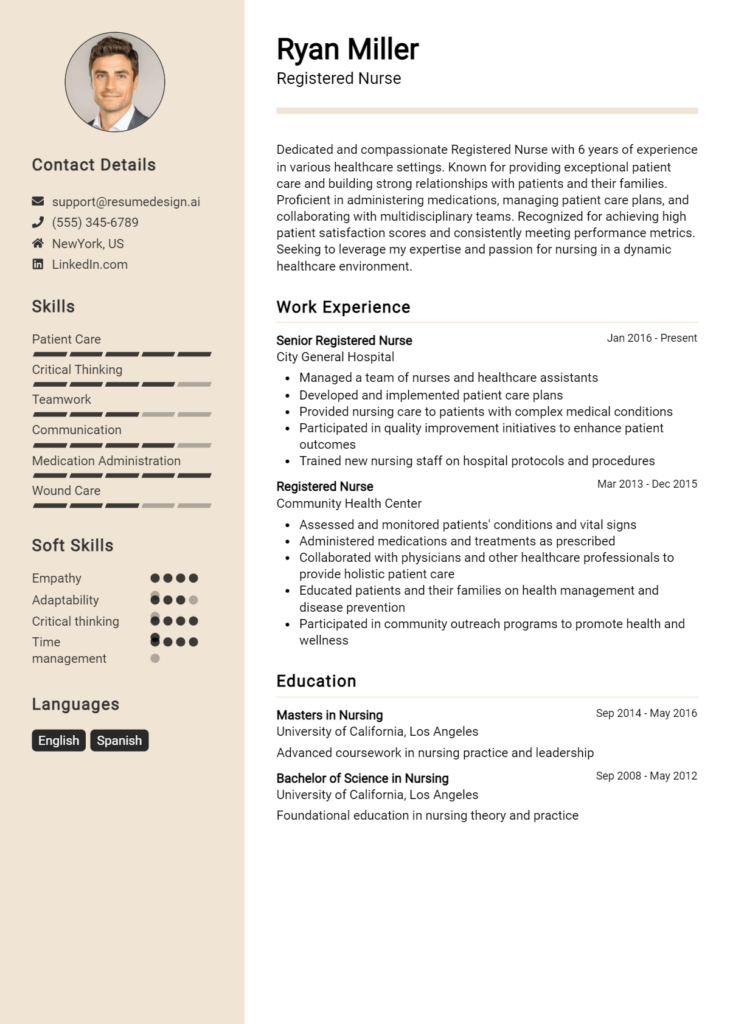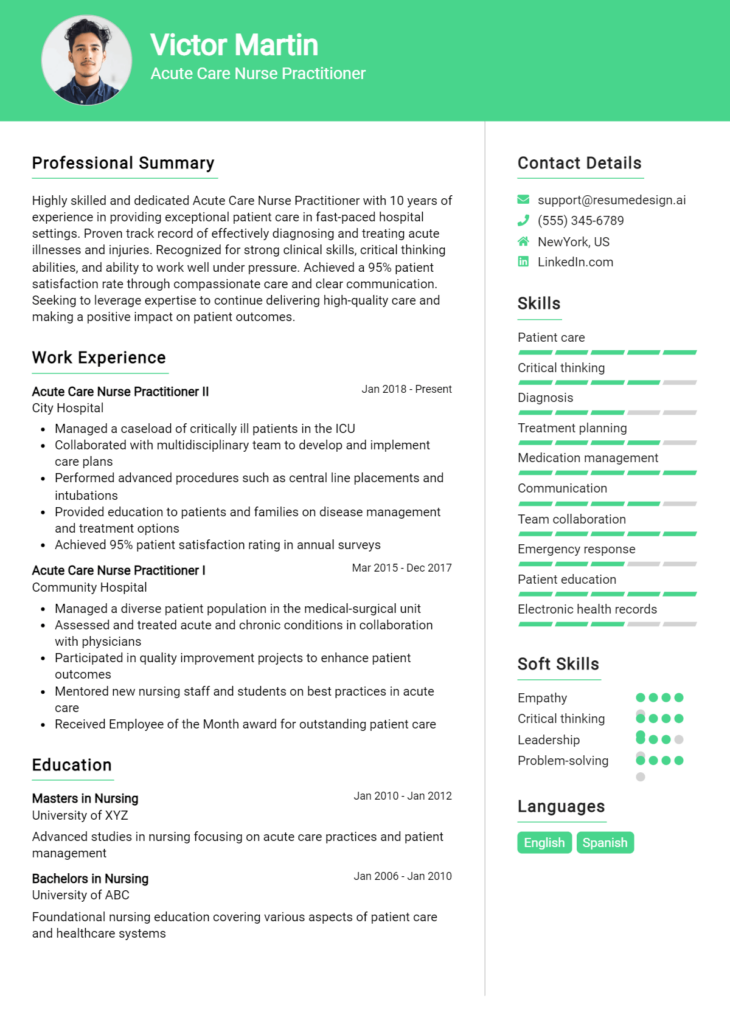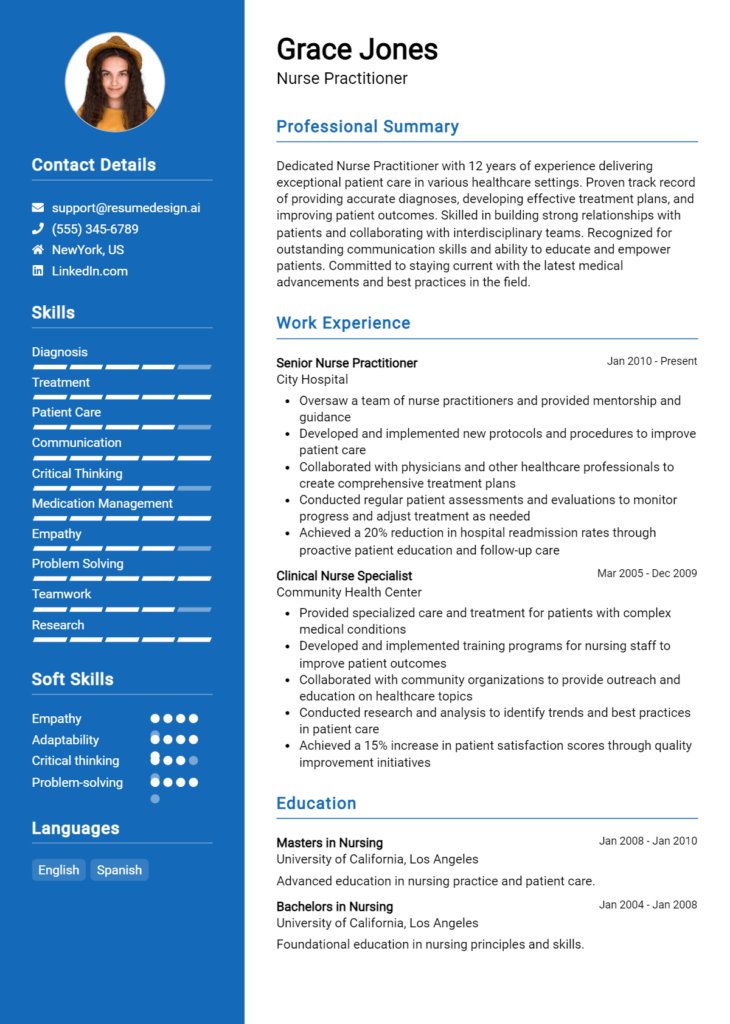Wound Care Nurse Core Responsibilities
A Wound Care Nurse plays a critical role in patient recovery by assessing, diagnosing, and treating various types of wounds. This position requires strong technical skills in wound management, operational efficiency in coordinating with healthcare teams, and exceptional problem-solving abilities to address complex patient needs. Bridging different departments, such as nursing, surgery, and rehabilitation, these professionals contribute to the organization’s goals by improving patient outcomes. A well-structured resume highlights these qualifications, showcasing the candidate's expertise and commitment to quality care.
Common Responsibilities Listed on Wound Care Nurse Resume
- Conduct thorough assessments of wounds and surrounding tissue.
- Develop and implement individualized wound care plans.
- Perform advanced wound care techniques, including debridement and dressing changes.
- Monitor and document patient progress and response to treatments.
- Educate patients and caregivers on wound care management.
- Collaborate with interdisciplinary teams to optimize patient care.
- Stay updated on the latest wound care technologies and practices.
- Provide training and support to nursing staff on wound care protocols.
- Manage wound care supplies and equipment inventory.
- Conduct research to improve wound care practices and outcomes.
- Participate in quality improvement initiatives related to wound care.
High-Level Resume Tips for Wound Care Nurse Professionals
In the competitive field of nursing, a well-crafted resume is crucial for Wound Care Nurse professionals seeking to make a lasting impression on potential employers. This document serves as the first point of contact, showcasing not just your qualifications but also your unique skills and achievements in wound care management. A strong resume can differentiate you in a crowded job market, highlighting your expertise in patient care and your ability to contribute positively to a healthcare team. This guide will provide practical and actionable resume tips specifically tailored for Wound Care Nurse professionals, helping you present your best self to prospective employers.
Top Resume Tips for Wound Care Nurse Professionals
- Tailor your resume to each job description by incorporating keywords that align with the specific requirements of the position.
- Highlight your relevant experience in wound care, emphasizing clinical settings where you have successfully managed patient wounds.
- Quantify your achievements with specific metrics, such as the percentage of wound healing success rates or the number of patients treated.
- Showcase your certifications and specialized training, such as Wound, Ostomy, and Continence Nursing Certification (WOCNCB) or Certified Wound Care Nurse (CWCN).
- Include a summary statement that succinctly encapsulates your experience and passion for wound care nursing.
- Demonstrate your soft skills, such as communication and empathy, as they are vital in providing patient-centered care.
- Utilize bullet points for clarity and conciseness, making it easy for hiring managers to skim through your qualifications.
- Incorporate volunteer experiences or community work related to wound care to showcase your commitment to the field.
- Keep the format clean and professional, using consistent fonts and spacing to ensure readability.
- Proofread your resume multiple times to eliminate any spelling or grammatical errors that could detract from your professionalism.
By implementing these tips, you can significantly enhance your chances of landing a job in the Wound Care Nurse field. A compelling resume that effectively showcases your skills and achievements will resonate with hiring managers and set you apart as a strong candidate in this specialized area of nursing.
Why Resume Headlines & Titles are Important for Wound Care Nurse
In the competitive field of nursing, particularly in specialized areas like wound care, a well-crafted resume headline or title serves as a crucial first impression for hiring managers. A strong headline can instantly capture attention, succinctly summarizing a candidate’s key qualifications and setting the tone for the rest of the resume. It should be concise, relevant, and directly related to the specific position being applied for, allowing candidates to highlight their unique strengths and experiences in the wound care domain. This immediate impact can significantly enhance the chances of moving forward in the hiring process.
Best Practices for Crafting Resume Headlines for Wound Care Nurse
- Keep it concise—aim for a one-sentence summary.
- Use specific terms related to wound care and nursing.
- Highlight your most relevant qualifications and experiences.
- Incorporate keywords from the job description.
- Showcase certifications or specialized training in wound care.
- Focus on your unique value proposition as a wound care nurse.
- Avoid jargon and overly complex language.
- Make it impactful—use action-oriented words when possible.
Example Resume Headlines for Wound Care Nurse
Strong Resume Headlines
Compassionate Wound Care Nurse with 5+ Years of Experience in Chronic Wound Management
Certified Wound Care Specialist Dedicated to Improving Patient Outcomes through Evidence-Based Practices
Results-Driven Wound Care Nurse with Proven Expertise in Advanced Wound Treatment Techniques
Dynamic Wound Care Nurse Committed to Patient-Centered Care and Innovative Healing Solutions
Weak Resume Headlines
Nurse Looking for a Job
Healthcare Professional with Various Skills
Wound Care Nurse Seeking Opportunities
Strong resume headlines are effective because they immediately convey the candidate's expertise and specialization in wound care, utilizing specific language that resonates with hiring managers. In contrast, weak headlines fail to impress due to their vagueness and lack of focus, leaving hiring managers without a clear understanding of the candidate's qualifications or unique strengths. A compelling headline sets the stage for a strong resume, demonstrating the candidate's commitment to the field and their potential contributions to the organization.
Writing an Exceptional Wound Care Nurse Resume Summary
In the competitive field of healthcare, a well-crafted resume summary is essential for a Wound Care Nurse to stand out among numerous applicants. This brief introductory paragraph serves as a powerful tool to quickly capture the attention of hiring managers by effectively showcasing key skills, relevant experience, and notable accomplishments directly related to wound care. A strong summary should be concise, impactful, and specifically tailored to the job the candidate is applying for, ensuring that it resonates with the employer’s needs and expectations.
Best Practices for Writing a Wound Care Nurse Resume Summary
- Quantify Achievements: Use specific numbers and percentages to highlight your accomplishments.
- Focus on Relevant Skills: Emphasize skills that are directly applicable to wound care nursing, such as assessment techniques and treatment modalities.
- Tailor the Summary: Customize your summary for each job application based on the job description and required qualifications.
- Highlight Certifications: Mention any relevant certifications, such as Wound, Ostomy, and Continence Nursing Certification (WOCNCB).
- Showcase Experience: Include years of experience and specific settings where you have practiced wound care.
- Use Action Verbs: Start sentences with strong action verbs to convey your proactive approach.
- Keep it Concise: Aim for 3-5 sentences that effectively summarize your qualifications without overwhelming the reader.
- Reflect Professional Values: Convey your commitment to patient care and evidence-based practices.
Example Wound Care Nurse Resume Summaries
Strong Resume Summaries
Compassionate Wound Care Nurse with over 7 years of experience in acute care settings, specializing in chronic wound management and patient education. Successfully reduced wound healing times by an average of 25% through tailored treatment plans and multidisciplinary collaboration.
Dedicated Wound Care Nurse with a proven track record of improving patient outcomes in long-term care facilities. Certified in Wound, Ostomy, and Continence Nursing, I have managed over 300 complex cases, achieving a 90% satisfaction rate among patients and caregivers.
Proficient Wound Care Nurse with 5 years of experience in hospital environments, skilled in advanced wound assessment and treatment techniques. Spearheaded a quality improvement initiative that decreased infection rates by 15% over 12 months.
Weak Resume Summaries
Wound Care Nurse with some experience looking for a new opportunity in healthcare. I am passionate about helping patients.
Experienced nurse seeking a wound care position. I have worked in various settings and enjoy patient care.
The examples provided illustrate the distinction between strong and weak resume summaries. Strong summaries are specific, quantifiable, and highlight relevant skills and achievements, making them impactful and tailored to the role of a Wound Care Nurse. In contrast, weak summaries lack detail, fail to emphasize accomplishments, and use vague language, which does not effectively communicate the candidate's qualifications or suitability for the position.
Work Experience Section for Wound Care Nurse Resume
The work experience section of a Wound Care Nurse resume is crucial as it serves as a platform to demonstrate the candidate's technical skills, leadership capabilities, and commitment to delivering high-quality patient care. This section not only highlights the nurse's hands-on experience in wound care management but also emphasizes their ability to work collaboratively in multidisciplinary teams. By quantifying achievements and aligning their experiences with industry standards, candidates can effectively showcase their value to potential employers, making this section a vital component of a compelling resume.
Best Practices for Wound Care Nurse Work Experience
- Detail specific wound care techniques and treatments you have mastered.
- Quantify outcomes, such as the percentage of patients healed within a specified timeframe.
- Highlight leadership roles in team settings, showing your ability to guide and mentor peers.
- Include any relevant certifications or training in advanced wound care practices.
- Demonstrate collaboration with other healthcare professionals to optimize patient care.
- Use action verbs to describe your responsibilities and achievements effectively.
- Tailor your experiences to reflect the demands of the specific job you are applying for.
- Provide context for each role, explaining the setting and patient population when relevant.
Example Work Experiences for Wound Care Nurse
Strong Experiences
- Led a team of 5 nurses in implementing a new wound care protocol, resulting in a 30% reduction in healing time for diabetic ulcers.
- Successfully managed a caseload of over 100 patients, achieving a patient satisfaction score of 95% through effective communication and care planning.
- Collaborated with a multidisciplinary team to design and execute a wound prevention program, decreasing hospital-acquired pressure injuries by 40% within one year.
- Conducted over 200 patient education sessions on wound care management, which improved patient compliance rates by 25%.
Weak Experiences
- Worked in wound care for a few months.
- Helped patients with their wounds occasionally.
- Assisted in a team but didn’t take any leadership roles.
- Participated in general nursing tasks without specific focus on wound care.
The examples deemed strong illustrate specific, quantifiable outcomes and demonstrate technical leadership, showcasing the candidate's impact on patient care and team dynamics. In contrast, the weak experiences lack detail, specificity, and measurable achievements, making them less compelling to potential employers. Strong experiences provide clear evidence of a candidate’s capabilities and contributions, while weak experiences do not effectively convey the candidate's skills or impact in the field of wound care nursing.
Education and Certifications Section for Wound Care Nurse Resume
The education and certifications section of a Wound Care Nurse resume is pivotal in showcasing a candidate's academic background and commitment to the field. This section not only demonstrates the foundational knowledge necessary for providing quality patient care but also highlights industry-relevant certifications and ongoing professional development. By including relevant coursework, specialized training, and certifications, candidates can significantly enhance their credibility and alignment with the job role, making them more appealing to potential employers.
Best Practices for Wound Care Nurse Education and Certifications
- Prioritize relevant degrees such as a Bachelor of Science in Nursing (BSN) or an Associate Degree in Nursing (ADN).
- Include industry-recognized certifications like the Wound, Ostomy, and Continence Nursing Certification (WOCNCB) or Certified Wound Care Nurse (CWCN).
- Highlight specialized training programs related to wound management and care.
- Detail continuing education courses that reflect the latest advancements in wound care treatments.
- Provide specific coursework that pertains directly to wound care, such as Advanced Pathophysiology or Clinical Management of Wounds.
- List any relevant professional organizations membership that supports ongoing education and networking in wound care.
- Use clear and concise formatting to ensure easy readability and accessibility of information.
- Regularly update this section to reflect new qualifications and certifications as they are obtained.
Example Education and Certifications for Wound Care Nurse
Strong Examples
- Bachelor of Science in Nursing (BSN) from XYZ University, Graduated May 2021
- Certified Wound Care Nurse (CWCN) - Wound, Ostomy, and Continence Nursing Certification Board, 2022
- Advanced Wound Management Course, ABC Institute, Completed March 2023
- Continuing Education in Pressure Ulcer Prevention, Online Course, Completed July 2023
Weak Examples
- Associate Degree in General Studies, Graduated December 2019
- First Aid Certification, American Red Cross, 2015
- Basic Nursing Course (not accredited), Completed 2010
- High School Diploma, Graduated 2005
The strong examples are considered effective because they directly relate to the qualifications and skills necessary for a Wound Care Nurse role, showcasing advanced education and relevant certifications. In contrast, the weak examples lack specificity and relevance to wound care, featuring outdated or general qualifications that do not demonstrate a commitment to continuing education or specialization in the field.
Top Skills & Keywords for Wound Care Nurse Resume
A well-crafted resume for a Wound Care Nurse is essential for showcasing the unique blend of skills necessary to excel in this specialized field. Wound care involves not only technical knowledge of wound management but also the ability to communicate effectively with patients, families, and other healthcare professionals. Highlighting both hard and soft skills on a resume can significantly enhance a candidate's appeal, as employers seek individuals who can provide compassionate care while also demonstrating clinical expertise. By carefully selecting and presenting these skills, candidates can create a compelling narrative that underscores their qualifications and readiness to take on the challenges of wound care.
Top Hard & Soft Skills for Wound Care Nurse
Soft Skills
- Empathy
- Excellent Communication
- Attention to Detail
- Problem Solving
- Team Collaboration
- Time Management
- Adaptability
- Patient Advocacy
- Critical Thinking
- Active Listening
- Emotional Resilience
- Conflict Resolution
- Interpersonal Skills
- Cultural Competence
Hard Skills
- Wound Assessment and Management
- Knowledge of Advanced Wound Care Products
- Infection Control Practices
- Debridement Techniques
- Patient Education
- Documentation and Reporting
- Pressure Ulcer Prevention
- Knowledge of Diabetic Foot Care
- Regulatory Compliance
- Use of Wound Care Technologies
- Skills in Surgical Wound Care
- Familiarity with Electronic Health Records (EHR)
- Pain Management Strategies
- Basic Life Support (BLS) Certification
By incorporating these skills into your resume and emphasizing relevant work experience, you can effectively demonstrate your qualifications as a Wound Care Nurse and stand out in a competitive job market.
Stand Out with a Winning Wound Care Nurse Cover Letter
Dear Hiring Manager,
I am writing to express my interest in the Wound Care Nurse position at [Hospital/Clinic Name] as advertised on [Job Board/Website]. With a solid background in nursing and specialized training in wound care management, I am confident in my ability to provide exceptional care for patients suffering from complex wounds. My commitment to holistic patient care, along with my strong clinical skills, make me an excellent fit for your team.
In my previous role at [Previous Employer], I successfully managed a diverse caseload of patients with varying wound types, including diabetic ulcers, pressure injuries, and surgical wounds. I utilized evidence-based protocols to assess wounds, develop individualized care plans, and educate patients on proper wound care techniques. Collaborating with interdisciplinary teams, I ensured that each patient received comprehensive care tailored to their unique needs. My dedication to continuous learning has led me to obtain certifications in advanced wound care and participate in workshops to stay updated with the latest advancements in the field.
I pride myself on my ability to foster strong relationships with my patients while promoting a supportive environment for their recovery. My empathetic approach not only helps in alleviating their concerns but also encourages adherence to treatment plans. I am excited about the opportunity to bring my skills to [Hospital/Clinic Name] and contribute to a team dedicated to improving patient outcomes through exceptional wound care.
Thank you for considering my application. I look forward to the possibility of discussing how my experience and passion for wound care align with the goals of your facility. I am eager to contribute to your mission of providing high-quality patient care and look forward to the opportunity to speak with you soon.
Sincerely,
[Your Name]
[Your Phone Number]
[Your Email Address]
Common Mistakes to Avoid in a Wound Care Nurse Resume
When crafting a resume for a Wound Care Nurse position, it's essential to present your skills and experience effectively. However, many candidates make common mistakes that can hinder their chances of landing an interview. By avoiding these pitfalls, you can create a more impactful resume that highlights your qualifications and expertise in wound care nursing. Here are some common mistakes to watch out for:
Generic Objective Statement: Including a vague objective that doesn't specifically relate to wound care nursing can make your resume blend in with others. Tailor your objective to reflect your passion and goals within the wound care specialty.
Lack of Specific Skills: Failing to highlight specialized skills relevant to wound care, such as knowledge of wound assessment techniques, dressing changes, and infection control, can diminish your appeal. Be sure to list specific competencies that set you apart.
Ignoring Certifications: Not mentioning relevant certifications, such as Wound, Ostomy, and Continence (WOC) certification, can be a missed opportunity. Certifications validate your expertise and commitment to the field, so ensure they are prominently displayed.
Overly Lengthy Resume: Submitting a resume that is too long can overwhelm hiring managers. Aim for a concise format that captures your experience and skills succinctly, ideally within one to two pages.
Neglecting Quantifiable Achievements: Omitting measurable accomplishments, such as improved patient outcomes or reduced healing times, weakens your narrative. Use data to showcase the effectiveness of your wound care practices.
Poor Formatting: A cluttered or unprofessional layout can distract from your qualifications. Utilize clear headings, bullet points, and consistent formatting to enhance readability.
Lack of Continuing Education: Failing to mention ongoing education or professional development in wound care can signal a lack of commitment to the field. Highlight any relevant courses, workshops, or conferences you have attended.
Not Tailoring for Each Application: Submitting a one-size-fits-all resume for various positions can lead to missed opportunities. Customize your resume for each job application, aligning your experience and skills with the specific requirements of the role.
Conclusion
As a Wound Care Nurse, you play a crucial role in patient recovery and overall healthcare. Your expertise in managing complex wounds, educating patients, and collaborating with healthcare teams is invaluable. Throughout this article, we explored the essential skills and qualifications that define a successful Wound Care Nurse, including advanced clinical knowledge, strong communication skills, and a compassionate approach to patient care.
To stand out in this competitive field, it's imperative to have a well-crafted resume that highlights your experiences and achievements. We encourage you to take a moment to review your Wound Care Nurse resume and ensure it accurately reflects your skills and expertise.
To assist you in this process, consider utilizing the various tools available, such as resume templates, which can help you create a visually appealing and professional document. If you're looking for a more interactive experience, try the resume builder that guides you step by step. Additionally, you can find inspiration from resume examples tailored specifically for nursing roles. Don't forget the importance of a compelling cover letter; check out our cover letter templates to make a lasting impression.
Take action today to enhance your resume and increase your chances of landing your dream position as a Wound Care Nurse!

